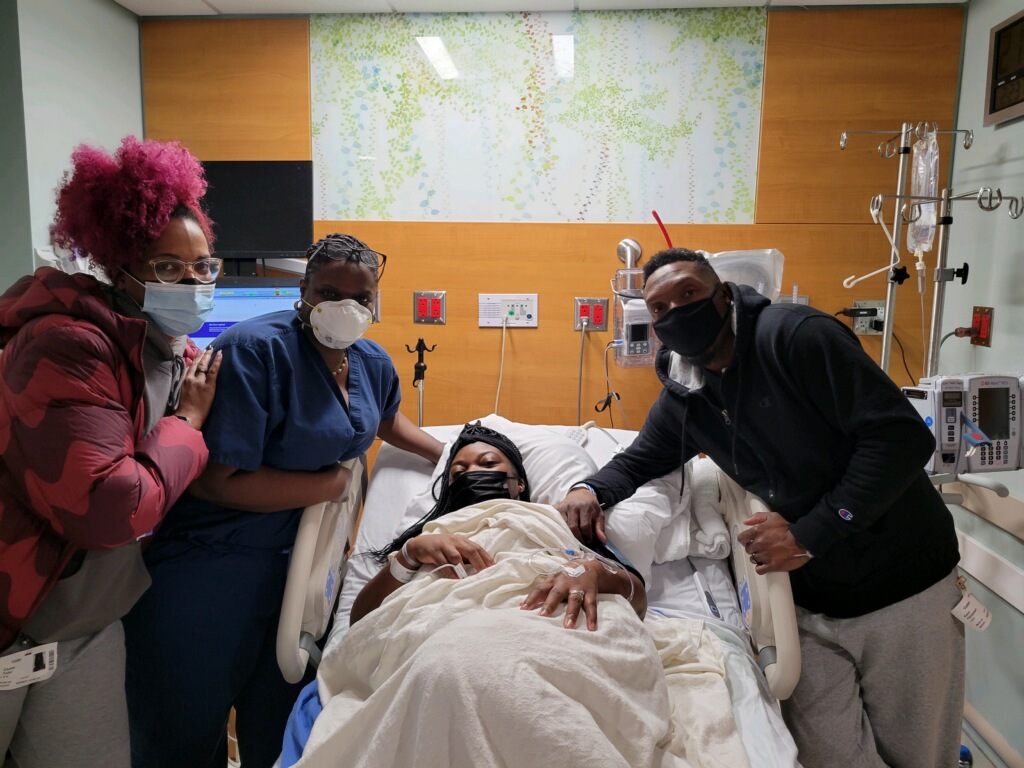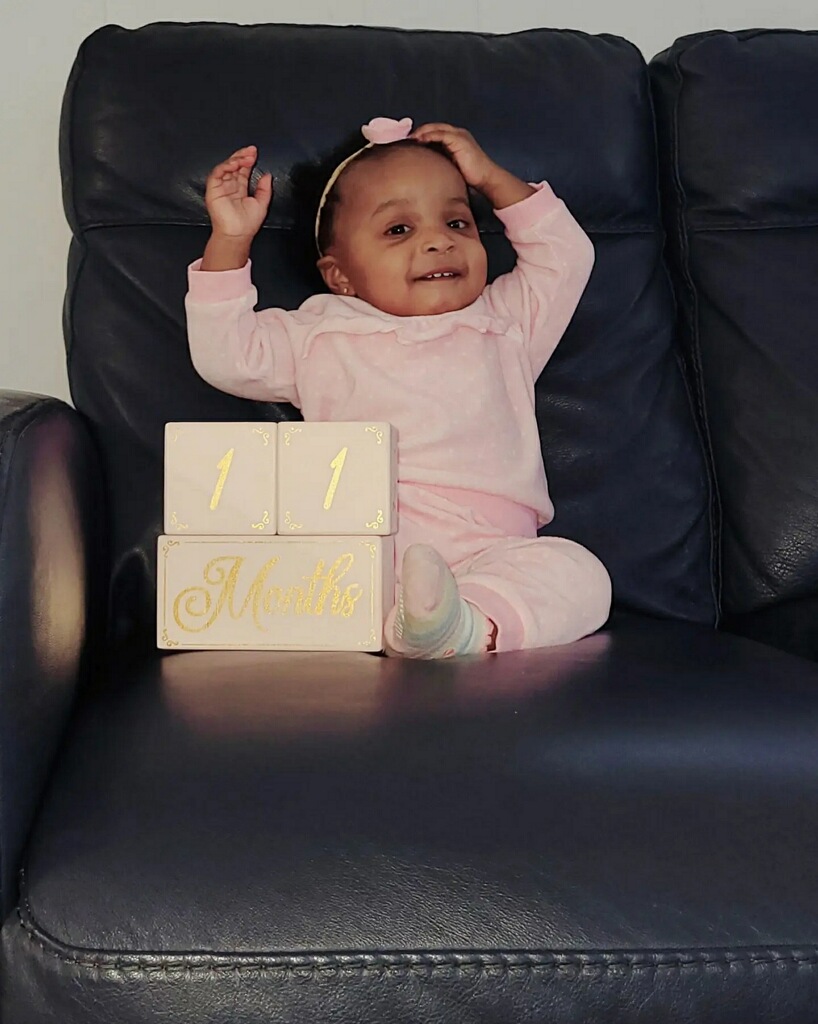A Reflection on Black Maternal Health: My Birth Story
In less than a week, my baby girl will turn one! When you’re a new parent, everyone always tells you how quickly the time goes by and to enjoy it – and boy, were they right. As you can imagine, as the time draws nearer, I’m thinking about, and reflecting on, the day she was born, and with that, so many emotions arise.
As I’m sure you’re aware, this year’s Black History Month theme is Black Health & Wellness – a topic and issue that is an often discussed and reported on. Not only are there major disparities when it comes to healthcare and health insurance within the Black community, but there is rightfully so, a mistrust of both the healthcare system and doctors, stemming from structural and systemic practices in place for many centuries. One of the most jarring statistics for me is around Black women and maternal health. When I found out that the extra weight around my midsection in May of 2020 wasn’t just the dreaded “COVID 15,” but a baby, I was equally excited and terrified for a myriad of reasons, but knowing that according to the CDC, Black women are three times more likely to die from a pregnancy-related cause than white women, and the fact that I was of “advanced maternal age,” put my anxiety at a 10/10 very quickly. I immediately started to manage the process and found a team of trusted professionals that could help me and my husband get through the pregnancy safely. I found a Black female OB-GYN who was highly recommended by a trusted friend, and a Black doula that could help us be as prepared as possible. The fact that they were Black (and extremely credible) was important to me, as it wasn’t just the data, but the horror stories that I’ve seen family and friends live through that was a strong motivator in making sure my team not only looked like me, but that they would have the cultural competency that I desired, and thought would make this amazing experience a positive one…which it was, for the most part.
Fast forward to February 22, 2021, when my husband and I went into the hospital as I was being induced that night, and I was a bag of nerves. Despite an uneventful and healthy pregnancy (outside of discovering I had two very small fibroids, an issue that nearly a quarter of Black women between 18 and 30 suffer with, and the numbers are more dramatic as you get older), I had it in my head that more things could go wrong when induced, and I wanted my labor and delivery to be as natural as possible. For someone who thought they had a high threshold for pain, I’m just going to say that THAT-PAIN-WAS-UNREAL. I consulted with my doctor and spoke with my doula regarding options for pain management, and after many hours of incredibly painful labor that I could no longer bear, given the time I still had to go; I got an epidural. Because of pre-existing scoliosis and a rod in my back from that surgery, I thought it wasn’t going to work, but we were successful after the fourth try, and I was extremely grateful to be able to labor more comfortably. My doula provided an amazing environment and helped me manage through the little pain that I did still have, and my doctor was on top of everything, and regularly checked on me during the night and day. Then the time finally came to push. I had my Black husband on my left, my Black doula on my right, and my actual doctor that I’d been seeing for nine months who is another Black woman about to deliver my Black daughter, during Black History Month, and I was feeling good. The pushing wasn’t bad, and my cheerleading squad had me pumped when my daughter’s head came out. Then my worst fear seemed like it was about to come true.
 My daughter was stuck under my pelvis and in a split second, the room, which was light, positive, and encouraging, turned into a scene that you might see on the TV show ER. I honestly don’t remember all of the details, but I had laid my head back and pulled my mask off in order to breathe properly for the grand finale. When I brought my head back up, there seemed to be at least 20 people in the room. My doctor told me to give a big push and I felt incredible pain, but at last, our baby was here. But then – she didn’t cry. Despite having the best care and advocates, I thought that the reason for all my anxiety was manifesting itself. Was I going to lose my first born? The pediatricians rushed Madison to the side of the room and my husband joined them, while my doula stayed with me. She had swallowed a lot of meconium and had a broken clavicle from what is called shoulder dystocia or being stuck under my pelvis. If they hadn’t gotten her out when they did, she would have lost oxygen, and well, you know the rest. It felt like hours had past, but after a few minutes, she cried loudly, and I finally exhaled. She was going to be fine.
My daughter was stuck under my pelvis and in a split second, the room, which was light, positive, and encouraging, turned into a scene that you might see on the TV show ER. I honestly don’t remember all of the details, but I had laid my head back and pulled my mask off in order to breathe properly for the grand finale. When I brought my head back up, there seemed to be at least 20 people in the room. My doctor told me to give a big push and I felt incredible pain, but at last, our baby was here. But then – she didn’t cry. Despite having the best care and advocates, I thought that the reason for all my anxiety was manifesting itself. Was I going to lose my first born? The pediatricians rushed Madison to the side of the room and my husband joined them, while my doula stayed with me. She had swallowed a lot of meconium and had a broken clavicle from what is called shoulder dystocia or being stuck under my pelvis. If they hadn’t gotten her out when they did, she would have lost oxygen, and well, you know the rest. It felt like hours had past, but after a few minutes, she cried loudly, and I finally exhaled. She was going to be fine.
 That experience made me realize that although I had the financial resources and ability to try and manage my situation where I had a team that listened to me, knew me, and was able to get me through the toughest day of my life, there are many BIPOC women that do not, and that result can be deadly. Make no mistake, education and socioeconomic status does not protect you from some of the bias and blatant racism that Black women and people have to deal with during vulnerable times – whether that’s childbirth or an illness. What’s important, is having care providers that are willing to use a touch of humanity to listen and address our concerns – a simple, but potentially lifesaving gesture. On February 23, 2021, at close to 8:30 p.m., the significance of that simple gesture stuck with me.
That experience made me realize that although I had the financial resources and ability to try and manage my situation where I had a team that listened to me, knew me, and was able to get me through the toughest day of my life, there are many BIPOC women that do not, and that result can be deadly. Make no mistake, education and socioeconomic status does not protect you from some of the bias and blatant racism that Black women and people have to deal with during vulnerable times – whether that’s childbirth or an illness. What’s important, is having care providers that are willing to use a touch of humanity to listen and address our concerns – a simple, but potentially lifesaving gesture. On February 23, 2021, at close to 8:30 p.m., the significance of that simple gesture stuck with me.
On that note, I couldn’t be more excited for a really interesting panel Prosek’s Culture, Diversity and Belonging committee will host next week on Black Maternal Health. The women speaking to us, my doula Ebonie “Karma” Tudor who is a New York-based mother, childbirth educator, certified lactation counselor and yoga instructor, and Linara Davidson Greenidge, author and associate dean at Columbia University will be sharing their stories and expertise with us to bring more awareness to the topic. Watch this space for a debrief of that conversation. ![]()
